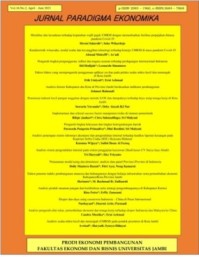Pengaruh efikasi diri siswa terhadap hasil belajar ekonomi dalam pembelajaran daring
DOI:
https://doi.org/10.22437/jpe.v16i3.12978Keywords:
Self-efficacy, Learning outcomes, Online learning, StudentsAbstract
In response to the Covid-19 pandemic, the Ministry of Education, through circular letter number 4 of 2020, notifies that the learning process is carried out from home through online learning. The time allocation carried out in online learning during the pandemic is shorter than the previous conventional learning. In the learning process, academic self-efficacy is very important. Through clear goals and self-confidence, academic self-efficacy can determine the success of academic behavior in the future. This article describes the research results on the effect of student self-efficacy on student learning outcomes in class X IPS SMAN 1 Sidoarjo on economics subjects in online learning. This type of research is explanatory and uses a quantitative approach. The population in this study was 109 students of class X Social Sciences at SMA Negeri 1 Sidoarjo. In comparison, the sample in this study was 85 students selected using a simple random sampling technique. Data collection techniques used are questionnaires and documentation. The data analysis technique used in this research is descriptive statistical analysis, which includes prerequisite analysis tests (normality test and linearity test) and simple regression analysis. This study indicates that the self-efficacy of class X IPS students at SMA Negeri 1 Sidoarjo does not affect economic learning outcomes in online learning.
Â
Downloads
References
Allo, M. D. (2020). Curriculum fidelity in the secondary education in Indonesia. International Journal of Psychosocial Rehabilitation, 24(6), 14088-14094
Anastasia Br Sembiring, R. O. (2021). Persepsi Siswa SMA selama pembelajaran daring saat pandemi Covid-19 . Koneksi, 5(1), 120-126.
Anitasari, Anitasari et al. (2021). Pengaruh efikasi diri terhadap perilaku menyontek siswa sekolah dasar selama pembelajaran daring. Jurnal Penelitian Ilmu Pendidikan, 14(1), 82-90
Bagas Kurnianto, R. D. (2020). Hubungan pola asuh orang tua terhadap motivasi belajar siswa pada pembelajaran daring masa pandemi . Seminar Pendidikan Nasional (SENDIKA),2(1), 1-11.
Bandura, A. (1995). Self-efficacy in changing societies. Cambrid University Press: New York
Bandura, A. (1997). Self-efficacy: the exercise of control. Journal of Cognitive Psychotherapy, 13 (2), 158-166
Bandura, A. (2001). Selfâ€efficacy beliefs as shapers of children's aspirations and career trajectories . Society for Reasearch in Child Development.72(1), 187-206.
Ekawati, N. E. (2018). Application of blended learning with edmodo application based on PDEODE learning strategy to increase student learning achievement. Jurnal Ilmiah Pendidikan MIPA, 8(1), 7-16.
Harahap, D. (2016). Analisis hubungan antara efikasi diri siswa dengan hasil belajar kimianya. Digital Reposito Universitas Negeri Medan, 43-45.
Sihaloho, L. (2018). Pengaruh efikasi diri (self efficacy) terhadap hasil belajar ekonomi siswa kelas XI IPS SMA Negeri Se-Kota Bandung. JINoP (Jurnal Inovasi Pembelajaran), 4(1), 62-70. https://doi.org/10.22219/jinop.v4i1.5671
Nasution, Mardiah Kalsum. Penggunaan Metode Pembelajaran Dalam Peningkatan Hasil Belajar Siswa. Studia Didaktika, 11(1), 9-16
Oktawirawan, D. H. (2020). Faktor pemicu kecemasan siswa dalam melakukan pembelajaran daring di masa pandemi Covid-19. Jurnal Ilmiah Universitas Batanghari Jambi, 20(2),541-544.
Fitriyani, R., & Fernandes, R. (2020). Pelaksanaan Student Centered Learning Berbasis Online pada Pembelajaran Sosiologi Siswa Kelas X IPS SMA Negeri 4 Bukittinggi Masa Pandemi Covid-19. Jurnal Sikola: Jurnal Kajian Pendidikan Dan Pembelajaran, 2(1), 8-18. https://doi.org/10.24036/sikola.v2i1.64
Ria Yunitasari, & Umi, H. (2020). Pengaruh pembelajaran daring terhadap minat belajar siswa pada masa COVID-19. Edukatif : Jurnal Ilmu Pendidikan , 2(3), 232-243.
Riyana, C. (2018). Konsep pembelajaran online. Produksi Bahan Pembelajaran Berbasis Online, 14-16.
Ryan Hidayat Rafiola, P. S. (2020). The effect of learning motivation, self-efficacy, and blended learning on students’ achievement in the industrial revolution 4.0 . International Journal of Emerging Technologies in Learning, 71-79.
Rafiola, Ryan Hidayat et al. The Effect of Learning Motivation, Self-Efficacy, and Blended Learning on Students’ Achievement in The Industrial Revolution 4.0. International Journal of Emerging Technologies in Learning (iJET), 15(8), 71-82.
Santoso, E. (2009). Pengaruh pembelajaran online terhadap prestasi belajar kimia ditinjau dari kemampuan awal siswa (Studi Eksperimen Pada Siswa Kelas X Sma Negeri 1 Purwantoro Wonogiri).Thesis. Program Pasca Sarjana. Universitas Sebelas Maret Surakarta: Surakarta
Saputri, N. P. (2013). Hubungan efikasi diri akademik dengan prestasi belajar siswa kelas XI SMK Negeri 1 Purbalingga. Skripsi. Fakultas Ilmu Pendidikan. Universitas Negeri Yogyakarta: Yogyakarta.
Sari, T. T. (2020). Self eficacy dan dukungan keluarga dalam keberhasilan belajar dari rumah di masa pandemi Covid-19. Journal Education Research and Development 4(2), 127-134.
Sri Utami, A. R. (2020). Kontribusi self -efficacy terhadap stres akademik mahasiswa selama pandemi Covid-19 periode April-Mei 2020 . Jurnal Bimbingan dan Konseling, 4(1),20-27 .
Sugiyono. (2011). Metode penelitian kuantitatif, kualitatif, R&D. Alfabeta: Bandung
Suwardi, R. D. (2012). Faktor-faktor yang mempengaruhi hasil belajar siswa kompetensi dasar ayat jurnal penyesuaian mata pelajaran akuntansi kelas XI IPS di SMA Negeri 1 Bae Kudus. Jurnal Pendidikan Ekonomi, 2(1), 1-7
Waruwu, M. (2020). Studi evaluatif implementasi pembelajaran daring selama pandemi Covid-19. Jurnal Administrasi Pendidikan, 27(2), 288-295.
Zimmerman, B. J. (2000). Self-efï¬cacy: an essential motive to learn. Contemporary Educational Psychology, 25(1), 82–91
Downloads
Published
How to Cite
Issue
Section
License
Copyright (c) 2021 Reny Nur Fadilah

This work is licensed under a Creative Commons Attribution-ShareAlike 4.0 International License.









